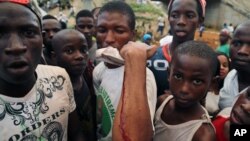Guinea goes to the polls Sunday to vote for president, but some are worried about ethnic fighting during or after the vote.
In the Dixinn neighborhood of the capital, Conakry, Amadou Bah was spending the Saturday morning before Guinea’s presidential election emptying out his electronics store. He feared if riots broke out after the election, as they have before, he would be targeted because he is a Fula and supports the country’s political opposition.
“Because of my language, and the one I support, the opposition leader, you know, maybe that’s why,” he said.
Bah’s fears underline what analysts and voters say is a wider truth about politics in Guinea: Many people choose how they vote based on a candidate's ethnic group.
Guinea’s ethnic politics will be crucial in deciding who triumphs in Sunday’s election. Incumbent Alpha Conde is standing for a second term. Of his seven opponents, former Prime Minister Cellou Dalein Diallo is expected to give him the stiffest challenge.
Political analyst Bano Barry said politicians in Guinea have long drawn support from their ethnic groups. The two leading candidates will get most of their support from their ethnic groups, he said; the Fula people will vote for Diallo and the Malinkes will vote for Conde.
Tensions have already flared in the run-up to the vote. In the country’s southeastern Banankoro district, five people were killed and dozens were injured Friday, according to the French news agency AFP.
Conakry was calm Saturday after rioting on Friday that killed one person.
Saran Toure said she planned to vote for Conde. She called for unity and hoped the vote would be peaceful.
Guineans should be unified, she said. Her view is that there aren’t Susu, there aren’t Fula, there aren’t Malinke, there aren’t Geuze — there are only Guineans, and they should all live together peacefully.
If no candidate receives a majority of votes, the election will go to a runoff.




